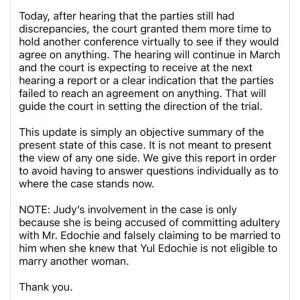Auto
Fuji Mi, Fuji Mi, The Source : A Journey Through The History And Leadership of Fuji Music By Alhaji Arems

Fuji Mi, Fuji Mi, The Source : A Journey Through The History And Leadership of Fuji Music
By Alhaji Arems
Fuji music, a genre deeply rooted in the cultural tapestry of Nigeria, has a rich history that dates back several decades. This article aims to take fans and the general public down memory lane, tracing the origins of Fuji music, its key figures, and the leadership that has shaped its evolution. It’s crucial to acknowledge and celebrate the pioneers who laid the foundation for this vibrant musical genre and correct any misconceptions that have arisen, especially among the younger generation.
The Beginnings of Fuji Music :
Fuji music emerged in the late 1960s and early 1970s, primarily within the Yoruba community of Nigeria. It was an evolution of the were music—a traditional Islamic music genre played during the Ramadan season. Fuji music blended elements of were, apala, and juju music to create a distinctive sound characterized by its energetic percussion, vibrant rhythms, and engaging call-and-response vocals.
The Pioneer : Alhaji Sikiru Ayinde Barrister
The genesis of Fuji music is closely tied to the name Alhaji Sikiru Ayinde Barrister, widely regarded as the creator and undisputed leader of Fuji music. Born on February 9, 1948, Barrister’s innovative approach transformed were music into Fuji, infusing it with modern instrumentation and dynamic stage performances. His impact on Fuji music was profound, as he popularized the genre both within Nigeria and internationally, earning a loyal fanbase that spans generations.
Leadership in Fuji Music: Past and Present :
Following the death of Barrister in 2010, the mantle of leadership within Fuji music has often been a topic of discussion. Alhaji Kollington Ayinla, another prominent figure in the Fuji music scene, is widely acknowledged as the current leader. Kollington, known for his unique style and powerful lyrics, played a significant role in shaping Fuji music alongside Barrister. His contributions to the genre are invaluable, and it is essential to recognize his position and influence within the Fuji community.
Correcting Misconceptions And Honoring Legacy :
In recent times, there has been a growing trend among younger Fuji artists and fans—often referred to as the “Indomie Generation”—to overlook the contributions of foundational figures like Kollington Ayinla. Some have even begun to lay claims to titles and positions that rightfully belong to the pioneers of Fuji music. This publication seeks to correct these misconceptions and ensure that due credit is given where it is deserved.
Kollington Ayinla, as the rightful heir to the leadership of Fuji music, deserves respect and recognition. While it is important to acknowledge the contributions of emerging artists, it should never come at the expense of those who paved the way for Fuji music to flourish. The legacy of pioneers like Barrister and Kollington must be preserved and celebrated, not overshadowed by contemporary claims.
Enlightening The New Generation :
It is imperative for the younger generation to be educated about the history and origins of Fuji music. Understanding the genre’s roots, the sacrifices and innovations of its pioneers, and the cultural significance it holds will foster a greater appreciation and respect for Fuji music. This knowledge will ensure that the legacy of Fuji music remains intact and that its leadership is rightfully honored.
Fuji music is more than just a genre; it is a cultural treasure that embodies the spirit and resilience of the Nigerian people. By acknowledging and celebrating the pioneers who created and shaped Fuji music, we preserve its rich history and ensure that future generations understand and respect its origins. As we look to the future of Fuji music, let us remember the words of Barrister and Kollington, who through their artistry, have left an indelible mark on the world of music.
Late SAB is the authentic Fuji Mi….
_Fuji mi, Fuji mi, the source—let us always remember where it all began._
Auto
Divorce Showdown: Yul and May Edochie’s Legal Battle Intensifies as Court Orders Further Talks

Divorce Showdown: Yul and May Edochie’s Legal Battle Intensifies as Court Orders Further Talks
The divorce saga between Nollywood star Yul Edochie and his estranged wife, May Edochie, has taken a new turn as their lawyer, Emeka Ugwuonye, shares fresh updates on the high-profile case.
In a dramatic legal development, the court held a compulsory conference as mandated by Nigerian family law. This legal process requires both parties to engage in discussions, along with their lawyers, in an attempt to resolve at least some of the contested issues before the court.
Ugwuonye, in a Facebook post, provided a detailed breakdown of the proceedings:
DPA UPDATE ON THE DIVORCE CASE OF MARY YUL-EDOCHIE V. YUL EDOCHIE AND UCHECHUKWU JUDITH MUOGHALU (JUDY AUSTIN)
“The court held a hearing on the case today. The issue before the court was the report of the compulsory conference previously ordered by the judge.
A compulsory or mandatory conference is a requirement in family law proceedings under Nigerian law. It provides an opportunity for the divorcing parties to discuss and attempt to reach agreements on certain aspects of their separation, such as property division and other contested matters. Any agreements reached are then conveyed to the court through a formal report.
However, in the last court session, it was revealed that no conclusive agreement had been reached between Yul and May Edochie. As a result, the court extended the timeframe for further discussions, granting them more time to hold another virtual conference.
The court expects to receive an updated report during the next hearing scheduled for March. If the parties continue to disagree, the court will then decide the direction of the trial.
This latest update comes as May Edochie continues to push for legal resolution regarding her marriage, while Judy Austin’s involvement in the case remains a key point of contention. She stands accused of committing adultery with Yul Edochie and falsely claiming to be married to him despite his legal ineligibility for a second marriage.
With tensions running high, all eyes are now on the next court date to see whether the estranged couple will reach any form of settlement or if the case will escalate into a full-blown courtroom battle.
Stay tuned for more updates on this unfolding legal drama.
Auto
Drama and Redemption: Carolyna Hutchings Publicly Apologizes to Laura Ikeji on Real Housewives of Lagos

Drama and Redemption: Carolyna Hutchings Publicly Apologizes to Laura Ikeji on Real Housewives of Lagos
Scottish-Nigerian actress and reality TV star Carolyna Hutchings has finally extended an apology to her fellow castmate, Laura Ikeji, in the ongoing season of The Real Housewives of Lagos, marking a dramatic turn in their long-standing feud.
Fans of the show will recall that Carolyna and Laura engaged in a fiery altercation during Season One, exchanging harsh words and insults. The intense clash led many viewers to believe that Carolyna had bullied Laura, who was reportedly pregnant at the time.
However, in a surprising twist in Episode Two of the latest Season Three, Carolyna took accountability for her past actions and expressed regret over the hurtful words she used against Laura. In an emotional moment, she publicly apologized for a rumor she had previously weaponized against her colleague.
“I heard an unflattering rumor about Laura, and I used it to abuse her, and I’m sorry. I made a statement that I wasn’t in a position to make. It didn’t matter if I heard it, saw it, or was told by a close friend; regardless, I wasn’t supposed to say that,” Carolyna confessed.
The apology has sparked mixed reactions among fans, with some applauding Carolyna’s maturity and growth, while others remain skeptical about the sincerity of her gesture. The unexpected reconciliation adds another layer of intrigue to the already drama-packed reality series.
With tensions seemingly easing between the two stars, viewers are left wondering if this marks the beginning of a new friendship or just a temporary truce. As The Real Housewives of Lagos unfolds, fans are eagerly watching to see how this newfound peace will impact the show’s ever-evolving dynamics.
Auto
Wizkid Flaunts Luxury Again: Acquires Ferrari 296 GTS After N1.4 Billion McLaren

Wizkid Flaunts Luxury Again: Acquires Ferrari 296 GTS After N1.4 Billion McLaren
Renowned Afrobeats sensation, Ayodeji Ibrahim Balogun, popularly known as Wizkid, has once again demonstrated his love for luxury with the acquisition of a brand-new Ferrari 296 GTS. This latest purchase further cements his status as one of Afrobeats’ most extravagant stars.
This acquisition comes shortly after Wizkid purchased a 2024 McLaren 750S, reportedly worth a staggering 1.4 billion naira. A recently surfaced video showcases the Ferrari being carefully driven down a ramp, giving fans a first glimpse of its striking red exterior.
The footage of Wizkid’s latest luxury ride has set social media abuzz, with fans and industry colleagues flooding him with congratulatory messages. Reports indicate that the Ferrari 296 GTS was purchased from the automobile brand Polcano and is valued at over 1.4 billion naira.
Wizkid’s taste for high-end automobiles is well-documented. In 2024, he also made headlines when he gifted his sister, Yetunde, a Range Rover worth 250 million naira as a festive season surprise.
With each new acquisition, Wizkid continues to showcase his success and love for luxury, solidifying his place among the elite in the entertainment industry.
-

 celebrity radar - gossips6 months ago
celebrity radar - gossips6 months agoWhy Babangida’s Hilltop Home Became Nigeria’s Political “Mecca”
-

 society6 months ago
society6 months agoPower is a Loan, Not a Possession: The Sacred Duty of Planting People
-

 society5 months ago
society5 months agoReligion: Africa’s Oldest Weapon of Enslavement and the Forgotten Truth
-

 news6 months ago
news6 months agoTHE APPOINTMENT OF WASIU AYINDE BY THE FEDERAL GOVERNMENT AS AN AMBASSADOR SOUNDS EMBARRASSING











